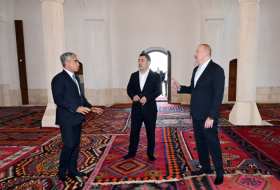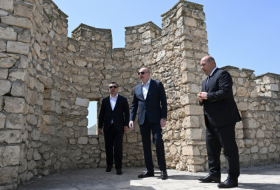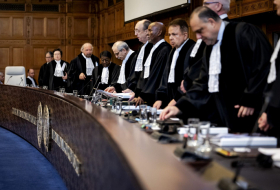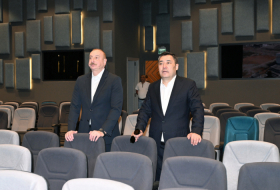Media reports say that the second meeting of the Russian-Armenian Lazarev Club was held in Moscow on March 5-6, 2019, the statement said.
"The official representatives of the executive and legislative powers of the Russian Federation represented by Advisor to the President of the Russian Federation Sergey Glazyev attended the meeting. Glazyev conveyed greetings of Russian President Vladimir Putin, as well as First Deputy Chairman of the Committee of the Russian State Duma for CIS Affairs, Eurasian Integration and Relations with Compatriots Konstantin Zatulin to the meeting participants," said the ministry.
“Earlier, the Azerbaijani Foreign Ministry expressed dissatisfaction and indignation to the Russian Foreign Ministry in connection with the invitation of representatives of the separatist regime created in the Azerbaijani territories occupied by Armenia to the first meeting of the aforementioned club, as well as with the statements made during the first meeting that openly infringe upon Azerbaijan’s sovereignty and territorial integrity," the statement reads.
“On the eve of the second meeting of the Lazarev Club, in response to a correspondent’s question about the position of the Russian Foreign Ministry regarding the invitation of the leaders of the separatist regime created in the occupied Azerbaijani territories to the meeting, the official representative of the Russian Foreign Ministry stressed that it is about the event with participation of the representatives of a civil society and non-governmental organizations and there is no information about the participation of representatives of the state bodies of the Russian Federation in the event. Moreover, it was stated that as a co-chair of the OSCE Minsk Group, the Russian Federation fulfills all its obligations,” the statement said.
"In this regard, we update the Russian side that the available specific data on the participation of high-ranking officials of the state bodies of the Russian Federation at the aforementioned meeting on March 5, 2019, where they were present along with representatives of the illegal regime created in the occupied Azerbaijani territories, is grossly contrary to the obligations of a co-chair country of the OSCE Minsk Group,” the Azerbaijani Foreign Ministry said.
“The obligations have been determined upon the mandate of the OSCE Minsk Group co-chairs, clearly indicating that “in their activity the co-chairs will follow the OSCE principles and standards, the UN Charter and the decisions of the OSCE forums, including the decision of the Council of Ministers on March 24, 1992, and in particular the decision of the Budapest Summit, as well as the corresponding resolutions of the UN Security Council"," the ministry said.
"Once again we call on the Russian side to fulfill the commitments undertaken within bilateral relations, in particular, compliance with the provisions of the Agreement on Friendship, Cooperation and Mutual Security between the Republic of Azerbaijan and the Russian Federation of 1997,” the statement reads.
“The agreement specifically states that "the Parties undertake not to support separatist movements, as well as prohibit and suppress the activity of individuals directed against the state sovereignty, independence and territorial integrity of other Party"."
The conflict between the two South Caucasus countries began in 1988 when Armenia made territorial claims against Azerbaijan. As a result of the ensuing war, in 1992 Armenian armed forces occupied 20 percent of Azerbaijan, including the Nagorno-Karabakh region and seven surrounding districts.
The 1994 ceasefire agreement was followed by peace negotiations. Armenia has not yet implemented four UN Security Council resolutions on withdrawal of its armed forces from the Nagorno-Karabakh and the surrounding districts.
More about: Foreign-Ministry Russia Nagorno-Karabakh
















































